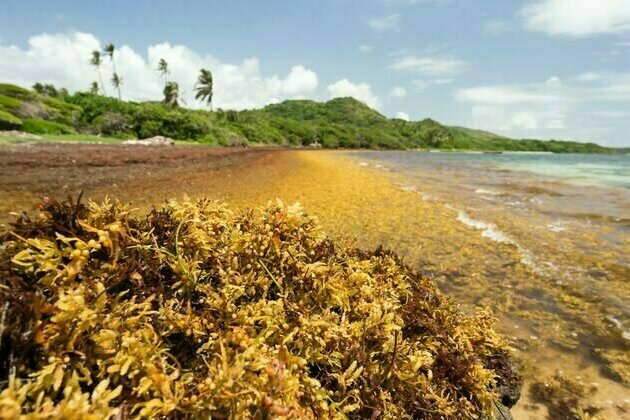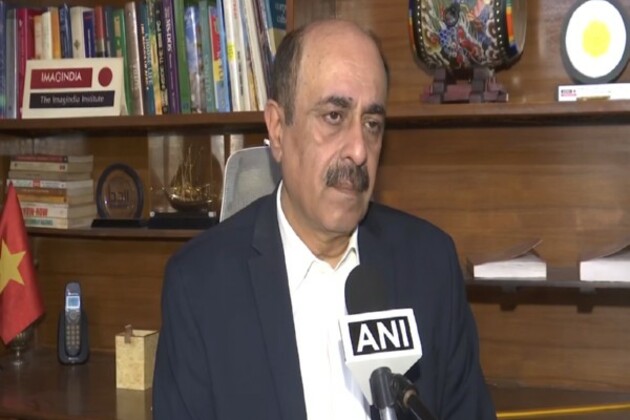How a toxic seaweed choking Caribbean beaches could become a valuable resource
The Conversation
15 May 2025, 14:11 GMT+10

Each year, between March and October, large amounts of brown seaweed called sargassum wash up on the shores of Caribbean islands - choking beaches, damaging marine life and threatening tourism and public health. But a number of local entrepreneurs are hoping the seaweed could create an economic opportunity.
From the coast of west Africa to the Caribbean Sea and the Gulf of Mexico, climate change is warming the temperature of the ocean. Seas are also becoming more acidic as water absorbs carbon dioxide. This all results in more intense growth of sargassum in the tropical Atlantic.
Small Caribbean nations are among the hardest hit. With 20 million tonnes of this seaweed washing up on the beaches in 2024, sargassum is fuelling an economic and public health crisis.
The piles of noxious seaweed on the Caribbean islands' white sandy beaches are putting off visitors to these islands and probably dampening tourism revenues.
Get your news from actual experts, straight to your inbox. Sign up to our daily newsletter to receive all The Conversation UK's latest coverage of news and research, from politics and business to the arts and sciences.
The fishing sector is also suffering, with blooms of seaweed getting caught up in fishing nets, often ripping them due to the weight of the seaweed. This makes it hard for fishers to catch fish and make a living.
The sheer volume of sargassum left to decompose on land produces toxic fumes that have forced people on islands like Guadeloupe to leave their homes. These toxic fumes have been linked to serious health issues including respiratory infections, sleep apnoea and even preeclampsia (high blood pressure during pregnancy).
The sargassum problem is just one of many slow-onset events that are being exacerbated by climate change. But gradual changes get much less attention or resources to address the consequences than, say, alarming wildfires or flash floods.
Slow-onset events are also much harder to quantify than climate-change-induced extreme weather, such as worsening hurricanes or floods. Our team at ODI Global, a thinktank, recently published a study that estimated the cost of these at US$2,000 (Pound 1,500) per person. Calculating the tourism lost each year due to seaweed inundation is trickier.
Despite these challenges, through small-scale, locally developed solutions, as well as government policies that support small businesses including helping them access climate finance, entrepreneurs can find sustainable solutions to help their populations thrive in an era of climate change.
Legena Henry, a lecturer at the University of the West Indies in Barbados, uses sargassum to produce a biofuel that can power cars. Johanan Dujon, the founder and chief executive of St. Lucia-based Algas Organics sells plant tonics made from sargassum and is trialling methods to convert sargassum into paper.
Meanwhile, other innovations are helping to minimise the impacts of sargassum in the region.
Andres Leon, founder of SOS Carbon, a spin-off organisation from the mechanical engineering department at the Massachusetts Institute of Technology, has designed a boat-based harvester to collect sargassum at sea to stop it from beaching and causing damage onshore.
Some islands, such as Jamaica, are using early warning systems, typically used to predict hurricanes, to predict the ocean currents that might bring a bumper arrival of the seaweed to their shores. This could give fishers up to 30 days notice of just how bad the inundation will be.
But while small businesses are emerging, turning them into larger enterprises across the region remains difficult. As usual, small island nations struggle to get funding because investors think the projects are too small and won't make enough money.
As Legena Henry recently told us on the Small Island Big Picture podcast, spending a few million dollars (as opposed to a few hundred million dollars) can feel administratively cumbersome for funders as they often have limited administrative capacity and large sums of money to manage.
Another issue is ensuring the benefits from any sargassum solutions flow into the affected Caribbean islands to support local growth and economic development.
Several opportunities exist for small island nations to generate some income from sargassum. They could, for example, sell licences to permit companies to harvest sargassum within their exclusive economic zones, which can stretch around many islands for hundreds of nautical miles.
They can also sell licences to businesses trialling or operating new sargassum technologies within their exclusive economic zones - for example, SOS Carbon has a patent pending for technology designed to sink sargassum to the seabed to store carbon.
Will sargassum continue to be a nuisance, or could it be an important renewable natural resource? It's not yet clear.
Ideally, as with other renewable natural resources in developing countries, small island nations that own the sargassum need to find ways to extract a fair share of the value from that ownership, as well as selling to external companies that come in, remove it and profit from it.
With tax incentives and low-cost finance for domestic innovators, small islands can manage and sell sargassum and then use the proceeds to develop climate resilience measures.
Don't have time to read about climate change as much as you'd like?
Get a weekly roundup in your inbox instead. Every Wednesday, The Conversation's environment editor writes Imagine, a short email that goes a little deeper into just one climate issue. Join the 45,000+ readers who've subscribed so far.
 Share
Share
 Tweet
Tweet
 Share
Share
 Flip
Flip
 Email
Email
Watch latest videos
Subscribe and Follow
Get a daily dose of Barbados Bulletin news through our daily email, its complimentary and keeps you fully up to date with world and business news as well.
News RELEASES
Publish news of your business, community or sports group, personnel appointments, major event and more by submitting a news release to Barbados Bulletin.
More InformationWorld
SectionSweden backs EU entry into Pacific trade bloc
STOCKHOLM, Sweden: Sweden plans to propose that the European Union join the Pacific Rim trading bloc, the CPTPP, aiming to create the...
Gujarat: Amit Shah inaugurates, lays foundation stone for 94 development projects worth Rs 1,593 cr
Gandhinagar (Gujarat) [India], May 19 (ANI): Union Home Minister and Gandhinagar Lok Sabha MP Amit Shah inaugurated the Pallav Bridge...
Rome: US Vice President Vance meets Zelenskyy to discuss Ukraine-Russia peace talks
Rome [Italy], May 19 (ANI): US Vice President JD Vance met with Ukrainian President Volodymyr Zelenskyy in Rome on Sunday (local time)...
Israel begins major ground offensive in Gaza
IDF troops have advanced into both the northern and southern areas of the enclave as part of Operation Gideons Chariots Israel launched...
Former US President Biden Diagnosed With Aggressive Prostate Cancer
Former US President Joe Biden has been diagnosed with an aggressive form of prostate cancer, and he and his family are reviewing treatment...
India can give "overview of things ever since Pahalgam terror attack," says defence expert
New Delhi [India], May 18 (ANI): Defence expert Robinder Sachdev hailed the decision of the government to send an all-party delegation...
Caribbean
SectionPuerto Rico courts manufacturers amid escalating global trade war
SAN JUAN, Puerto Rico: As the global trade war deepens, Puerto Rico is seizing the moment to lure international companies to relocate...
"Just the beginning...": Neeraj thanks coach, physio after breaching 90 m mark at Doha
New Delhi [India], May 19 (ANI): Indian world champion and Olympic gold medalist javelin thrower Neeraj Chopra expressed happiness...
IPL 2025: KL Rahul accomplishes unprecedented century milestone during GT clash
New Delhi [India], May 18 (ANI): Delhi Capitals (DC) batter KL Rahul became the first ever player in the history of Indian Premier...
IPL 2025: KL Rahul accomplishes unprecedented century milestone during RR clash
New Delhi [India], May 18 (ANI): Delhi Capitals (DC) batter KL Rahul became the first ever player in the history of Indian Premier...
IPL: KL Rahul completes 8,000 runs in T20 cricket, surpasses Virat Kohli to become fastest Indian to reach milestone
New Delhi [India], May 18 (ANI): Delhi Capitals (DC) batter KL Rahul completed 8,000 runs in T20 cricket after posting a memorable...
(SP)QATAR-DOHA-TABLE TENNIS-ITTF WORLD CHAMPIONSHIPS FINALS-WOMEN'S DOUBLES
(250518) -- DOHA, May 18, 2025 (Xinhua) -- Daniela Fonseca/Estela Crespo(R) compete during the women's doubles round of 64 match between...













